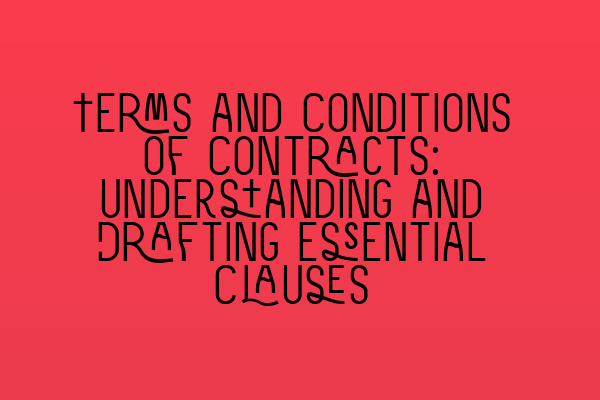Terms and Conditions of Contracts: Understanding and Drafting Essential Clauses
Contracts are a crucial aspect of modern business transactions, ensuring that all parties involved are bound by specific terms and conditions. These agreements provide a framework for conducting business and outline each party’s rights, obligations, and responsibilities. To create a strong and enforceable contract, it is essential to understand and draft the essential clauses that should be included.
In this article, we will explore the key elements of contracts and discuss the importance of incorporating these clauses. Whether you are a solicitor, business owner, or individual entering into a contractual agreement, this guide will offer valuable insights into contract law.
The Purpose and Importance of Contracts
A contract serves as a legally binding agreement between two or more parties. It establishes the rights and obligations of each party, providing clarity and preventing disputes. The terms and conditions outlined in a contract must be mutually agreed upon and are enforceable by law.
Contracts play a vital role in business transactions, ensuring that parties comply with their obligations and protecting their interests. By clearly defining the terms of the agreement, contracts provide certainty, reduce misunderstandings, and serve as a foundation for resolving disputes.
Now, let’s dive into the essential clauses that should be included in your contracts:
1. Definition and Interpretation
The definition and interpretation clause sets out the key terms and phrases used throughout the contract. It ensures that all parties understand the meaning of specific terms to avoid ambiguity or confusion. This clause is especially important when dealing with complex or technical matters.
For more information on navigating legal challenges and pitfalls in your practice, click here.
2. Scope and Duration
The scope and duration clause outlines the scope of work or services to be provided under the contract and specifies the period during which the contract remains valid. This clause ensures that both parties have a clear understanding of the project or services involved and the expected timeline for completion.
3. Payment Terms and Pricing
The payment terms and pricing clause addresses the cost of goods or services and the agreed-upon payment schedule. It includes information on payment methods, due dates, and any late payment penalties or interest charges. This clause helps prevent disputes and ensures that both parties understand their financial obligations.
4. Performance and Delivery
The performance and delivery clause stipulates the standards of performance, quality, and delivery timelines required under the contract. It defines the expectations of each party and provides a basis for assessing compliance. Additionally, this clause may include provisions for inspection, testing, and acceptance of goods or services.
5. Confidentiality and Non-Disclosure
The confidentiality and non-disclosure clause protects sensitive information shared between the parties during the course of the agreement. It prohibits the disclosure of confidential information and ensures that both parties maintain the confidentiality of trade secrets, client information, proprietary data, etc.
If you are interested in a comprehensive comparison between barristers and solicitors, click here.
6. Termination and Dispute Resolution
The termination and dispute resolution clause outlines the conditions under which the contract may be terminated and defines the procedures for resolving disputes. It may include provisions for mediation, arbitration, or litigation, depending on the preferences and agreed-upon methods of dispute resolution.
Conclusion
Understanding and drafting essential clauses is crucial when creating contracts that are clear, enforceable, and protect the interests of all parties involved. By incorporating these clauses into your agreements, you can avoid disputes, establish certainty, and ensure compliance with contractual obligations.
For more information on different solicitor specializations and finding your niche, click here.
Drafting contracts can be complex, and seeking professional legal advice is always recommended. If you require assistance with contract law or have specific questions about drafting terms and conditions, don’t hesitate to reach out to an experienced solicitor.
For top recommendations on law schools in the UK, click here.
With the rise of virtual law practices, it’s important to stay up-to-date with the latest trends and developments. To learn more about embracing the virtual law practice model, click here.
